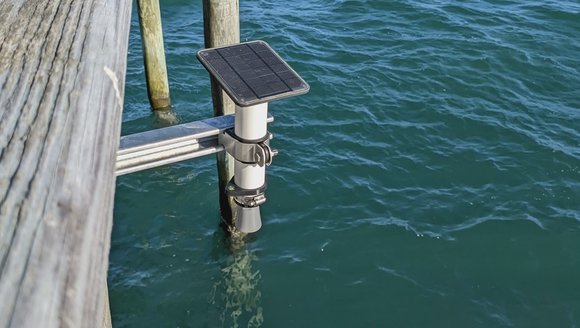2022 Research Progress Update
Announcements | Nov 21, 2022
To keep you updated on our research team's progress, we've developed a report showcasing some of the achievements from our labs. More broadly, this report describes how our research program leverages its capacity to attract funding, produce data-driven results, and foster relationships within the scientific community.
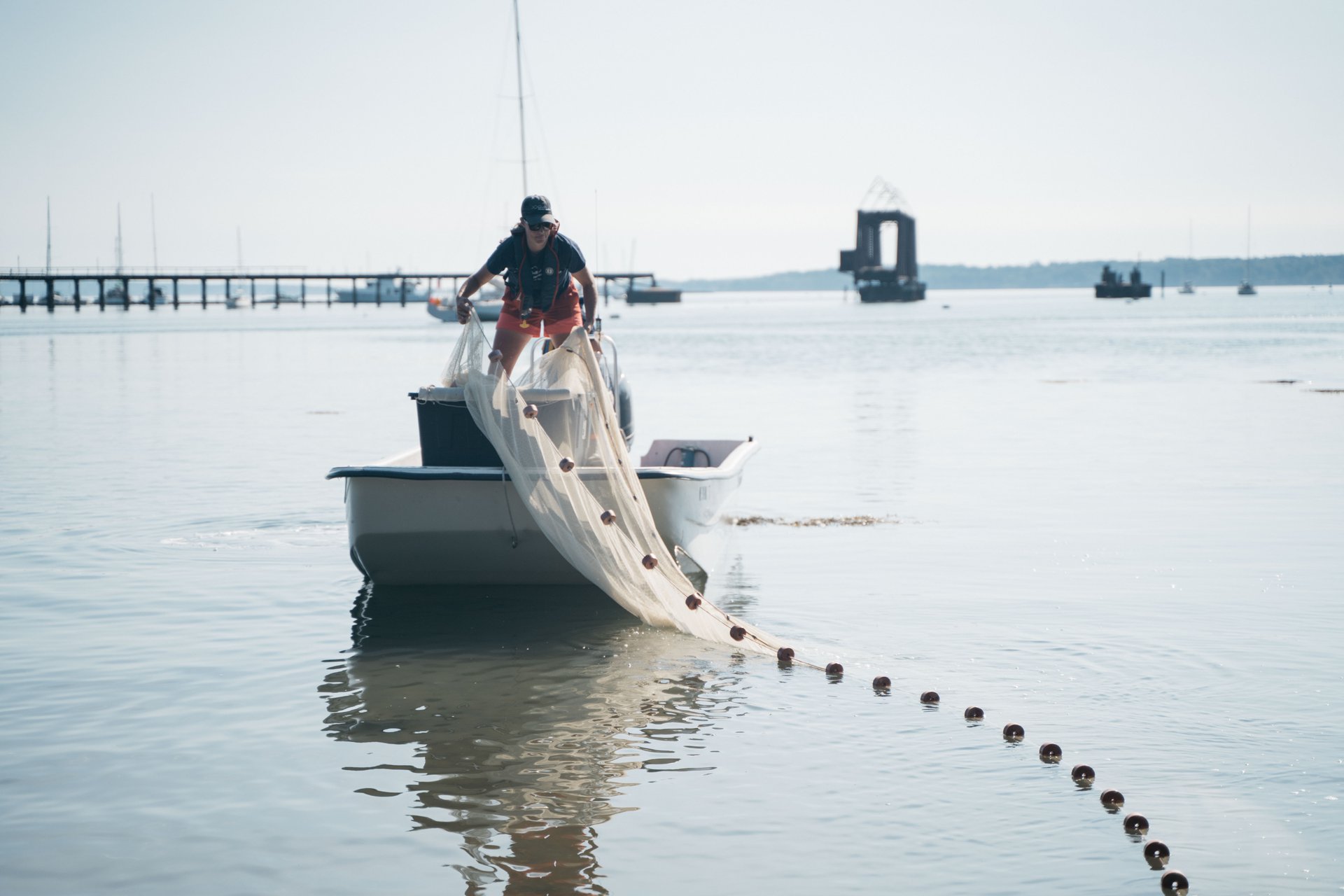
GMRI Research at a Glance
Here's a quick look at things like research team size, our research budget, publications, and more.
Research Team Size
Full-time GMRI Research Staff
Our research team grew from 21 to 25 this year.
University of Maine
One University of Maine faculty member and seven students and staff contributed to GMRI research this year.
Interns
This year, we were fortunate to receive research support from 18 interns, including nine who contributed to Dr. Walt Golet's Pelagic Fisheries Lab.
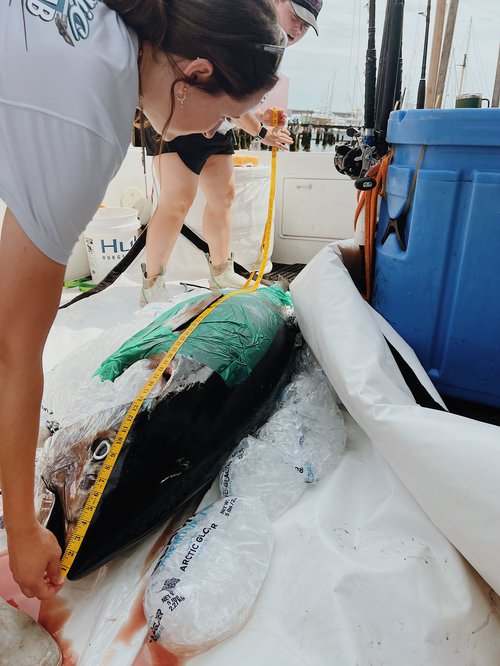
Budgets, Grants, and Contracts.
Total Research Budget
Compared to 2021, this year's research budget grew by nearly one million dollars.
Active Grants and Contracts
36 Federal and State grants and contracts make up the majority, but we've also secured five grants and contracts through foundations or other means.
Proposals Submitted for Funding
Explore other projects that have been funded by proposals like these in years past.

Days spent at sea: Skiff
A 19' DLX Carolina Skiff named Havin Fundulus II enables our CBASS, mussels, and OMICS (eDNA) research.



Days at sea: Merlin
Our new research vessel, a Spencer Lincoln 37’ custom tuna boat named Merlin, was mostly used to conduct OMICS (eDNA) research.
Funding Requested
Federal Funding
Of the $5.6m, we've been awarded $2.3m, which represents a 4% increase over FY21.
Foundation Funding
We've been awarded $224k, with the remaining $100K pledged.
2022 Research Highlights
I. Leadership
In March of 2022, Janet Duffy-Anderson joined the GMRI team as the Chief Scientific Officer after serving in the federal fisheries service working in Alaskan marine ecosystems for twenty years. At GMRI, Janet is building on the research team’s strengths in climate and fisheries expertise to advance holistic, ecosystem-based fishery science through scientific research, multi-disciplinary collaboration and partnerships, and stakeholder engagement.
Important new efforts for GMRI include building climate-resilient fisheries networks (FishSCORE), using artificial intelligence in fisheries science, advancing the coastal economics of climate change adaptation efforts (SLR, seafood supply chain), and work to further the Northeast Climate Integrated Modeling project (NCLIM). In addition to tackling new research, mentoring and guiding the professional development of the research team is a top priority. Opportunities for professional advancement include leadership and supervisory training, participation in cross-institutional syntheses, scoping lab growth potential with early career PIs, attending at international conferences, and cross-institutional networking.
As part of our new 2023–25 Strategic Plan, we are placing a greater focus on the integration of scientific research throughout the organization’s Departments — whether that be in the traditional research department, the Learning Sciences Lab in education, physical sciences work including sea level rise & coastal flooding efforts within the Climate Center, or pending plans for a re-invigorated aquaculture program inclusive of research within the community department. We envision that cultivating a broad research portfolio across GMRI will foster new opportunities to advance the long-term sustainability, growth, and resilience of the Gulf of Maine (GOM) and the people that depend on it.
Janet is especially grateful to Interim CSO Graham Sherwood during her CSO transition. There was a critical, month-long period of overlap between Janet and Graham with numerous valuable discussions of opportunities, strategies, and approaches. Graham officially stepped down from the Interim role in June of 2022.

II. Partnership Highlights
Climate Center
Janet and Climate Center Director Dave Reidmiller are building a comprehensive, integrated, climate-ecosystem science portfolio between the Climate Center and the Research Department that strengthens our ability to detect, understand, and respond to climate-mediated changes in the GOM and adjacent marine ecosystems. It will leverage existing capacity in fisheries, coastal ecology, ecosystem integration, and socio-economics with recruited expertise in physical sciences and lower trophic ecology. In addition, the Climate Center will hire new staff at the Principal Investigator level to expand mechanistic, process research (physical oceanographer, biological oceanographer, coastal geomorphologist, coastal ecologist).
New partnerships across federal (NOAA), state (DMR), academic (Northeastern University’s Roux Institute, UMaine) organizations will also deepen fisheries research with application to management (Research Track Stock Assessment), and growth in the Coastal and Marine Socio-Economics laboratory (Postdoctoral Associate, Data Analyst, Convener) to advance links between the seafood and blue economy issues.
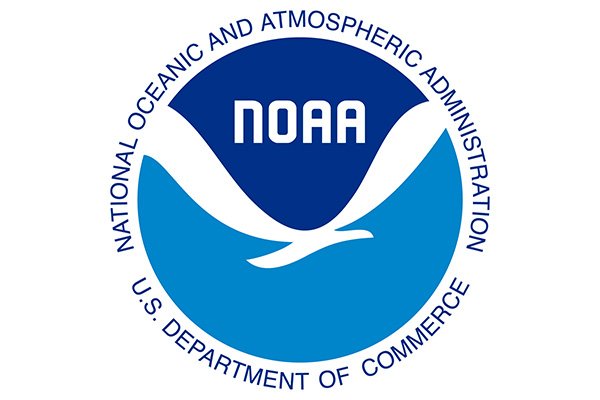

Additional Partnerships
GMRI is partnering with the Maine Department of Marine Resources to conduct baseline marine fisheries and ecosystem surveys at the proposed floating offshore wind research array. The goals of the research are to evaluate the impact and opportunities afforded by the development of offshore wind on the marine environment and the users that depend on it, and to determine how future wind arrays can optimally co-exist with traditional ocean uses. Particular emphasis is placed on understanding and mitigating impacts to fisheries. Research will be used to make recommendations for socially and environmentally responsible development, create and support coastal communities, and advance floating wind technologies.
GMRI scientists are stewarding the relationship between offshore wind development and fisheries in other capacities as well, Dr. Janet Duffy-Anderson serves on the National Academy of Sciences Standing Committee on Offshore Wind and Fisheries which provides guidance and advice to BOEM, and Dr. Graham Sherwood serves on the Advisory Board for the Offshore Wind Research Consortium, which will provide guidance and expertise regarding OSW development in the Gulf of Maine.
Janet and Dave have been working closely with colleagues at Northeastern University’s Roux Institute to develop a formal partnership to advance the use of Artificial Intelligence in climate-ecosystems work. The impacts of climate change are immediate, diverse, and cross-scale, and partnering with Roux is an exciting opportunity to make meaningful strides in climate adaptation and preparedness. Climate adaptations projects in the coastal and marine space with regional, national, and international resonance that capitalize on joint organizational expertise include:
- Advancing the use of AI in the development of climate and ecosystem metrics in next-generation fishery stock assessments to decrease harvest uncertainty and evaluate associated implications for sustainable management and resilience of fishery resources (with Dr. Lisa Kerr);
- Optimizing fishing portfolios at community scales based on species availability, fishing fleet expansion, fleet composition, and economic cost-benefit tradeoffs (with Dr. Kathy Mills);
- Bringing together long-range, atmosphere-ocean insights to identify climate risks facing fishing communities and helping fishermen identify climate-resilient fishing strategies (with Dr. Kathy Mills);
- Examining impacts of climate and other anthropogenic activities on ecosystem production, biodiversity, and resilience (with Dr. Graham Sherwood);
- Integrating how expanding ocean activities alter societal decisions and ocean uses (fishing, shipping, tourism, climate buffers, production, etc.) (with Dr. Kanae Tokunaga);
- Improving data management, data connectivity, and data system infrastructure to advance the design, implementation, and performance of end-user interfaces with atmosphere, ocean, and biological data suites (with Riley Young-Morse);
- Utilize machine learning to identify patterns and congruities in coastal hazard and sea level rise science (Dr. Hannah Baranes) and anticipated growth in coastal geomorphology to more accurately reflect the reality of the interplay between climate-coastal zone sea level rise flooding dynamics.

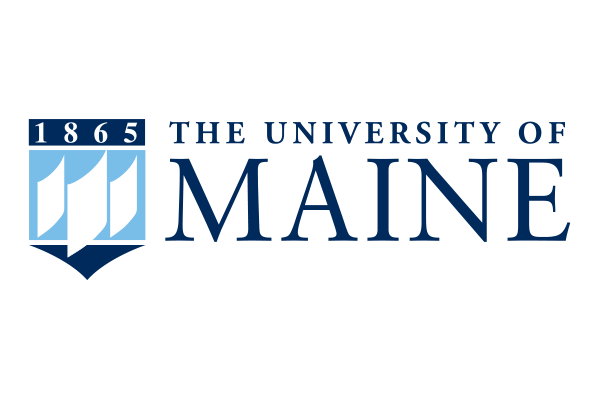
III. Supporting Early-Career Scientists and Expanding the Research Staff
The Climate Center and research team crafted a comprehensive research portfolio outlining the expertise suite needed to address climate-mediated ecosystem change in the Gulf of Maine and adjacent large marine ecosystems.
Within the next 12 months GMRI will hire:
- 1 new Principal Investigator to be hired with FY23 funding (Biological Oceanographer).
- 2 new postdocs hired in late FY22 (Fisheries Ecology).
- 1 new postdoc to be hired with FY23 funding (Coastal and Marine Economics).
- 1 new Project Manager to be hired in FY23 (FishSCORE) in climate resilient fisheries networks
(Integrated Systems). - 1 new Principal Investigator to be hired with FY24 funding (Physical Oceanographer).
- 1 new Principal Investigator to be hired with FY24 funding (Coastal Geomorphologist).
Supporting Students: Undergraduate Training
This past summer, GMRI led its fourth successful NSF Research Experience for Undergraduates (REU) site, its second successful NOAA IN FISH (Inclusive NOAA Fisheries InternShip Program) opportunity, and its first NASA undergraduate intern. These programs advance our goals to train and build a more inclusive and diverse research community that conducts research and management in marine and environmental sciences. Students from diverse backgrounds bring a variety of perspectives and approaches to research, and GMRI is committed to building an inclusive marine science workforce to better address the complex issues facing the region. Projects this year included examination of climate-induced shifts in fisheries landings dam removal effects, local sea level rise adaptation strategy, mussel habitat characterization, oyster growth variability, a middle school learning experience assessment, and bluefin tuna movements and stock structure. Students and mentors agreed the experience was both a valuable component of GMRI research and undergraduate learning and scientific development.
Supporting Students: Graduate Training
GMRI partners with UMaine to train graduate students in marine science. Several students are active in Dr. Walt Golet’s lab conducting research on stock structure, movement, and ecology of tuna and other Highly Migratory Species. A number of these activities are in partnership with Dr. Lisa Kerr and serve to inform highly migratory species (HMS) stock assessment efforts. In addition, Research Associate Aaron Whitman began a master's program at UMaine in Fisheries Ecology to advance understanding of long-term climate-mediated ecosystem and fisheries changes on the GOM continental shelf. Finally, GMRI hosts a University of Southern Maine student, Samantha Bengs, who will begin a master's degree program later in FY23 to understand ecosystem shifts in nearshore, coastal habitats, with Graham Sherwood serving as a committee member.
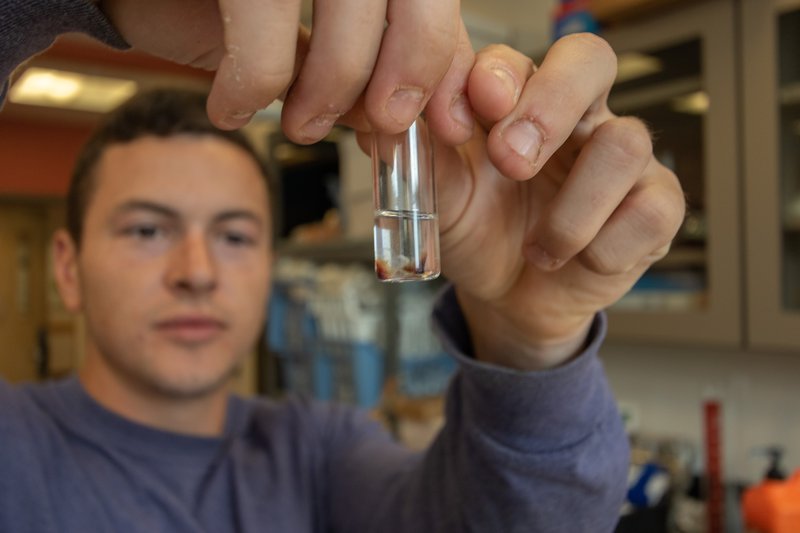
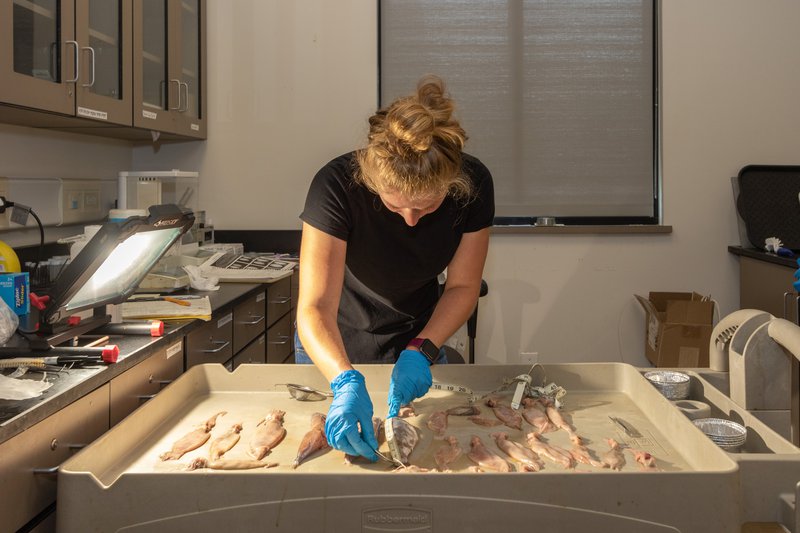
IV. Lab Updates
Fisheries Ecology Research
Graham Sherwood’s Fisheries Ecology Lab continues to carry on the tradition of on-the-water, observational research at GMRI.
Projects in the Fisheries Ecology Lab include:
- The Casco Bay Aquatic Systems Survey (CBASS) — launched in 2014 to monitor changes in the nearshore marine ecosystem in response to various drivers including warming, dam removals, and nutrient runoff. Consistent activities over the last 9 years include a beach seine survey (632 seine hauls to date), river monitoring for alewife migrations, and temperature monitoring. This survey has also formed the basis for multiple REU research projects.
- Validating environmental DNA as a fisheries assessment tool.
- An NSF EPSCoR-funded project (through the Maine-eDNA program at UMaine) to compare eDNA characterizations of inshore fish community patterns with those derived via seine surveys (i.e., CBASS).
- Exploring nutrient dynamics (and related acidification issues) through the lens of stable nitrogen isotope signatures in blue mussels. In 2021 and 2022, his lab's mussel work expanded to include investigation of the impact of increased nitrogen levels on mussel health and application of acoustic techniques to survey sub-tidal mussel beds. This work is highly relevant to our collaborations with local research/monitoring groups (i.e., Casco Bay Monitoring Network) and helps us deepen scientific relevance in our own backyard.
- Contributing to baseline monitoring in the Maine Offshore Wind Research Array. This DMR-funded project involves an acoustic survey of the pelagic community as well as water sampling for eventual eDNA analysis. Sherwood also serves on Maine's Offshore Wind Roadmap, Environment and Wildlife working group.
The Fisheries Ecology Lab is currently staffed by Research Associate Aaron Whitman and Postdoctoral Researcher Katie Lankowicz. As part of the Me-eDNA project, Aaron will incorporate the eDNA results from the CBASS and Omics work in his thesis research. Katie is conducting research on habitat associations in groundfish for the purpose of understanding the impact of density and habitat-related distributional shifts on survey efficacy. This work, funded by NOAA through CINAR, is part of a larger collaboration between NOAA, SMAST, and Northeastern University to help bridge the gap between fishermen's knowledge and NOAA surveys.
Integrated Systems Ecology
Kathy Mills leads the Integrated Systems Ecology Lab, which analyzes and distills complex ocean data to understand social-ecological system dynamics and inform decisions that promote conservation planning and resilient fisheries in a changing ecosystem.
Projects in the Integrated Systems Ecology Lab include:
- Production of seasonal and annual updates on sea surface temperature patterns in the Gulf of Maine In partnership with the Climate Center and the GMRI Communications team.
- Investigation of the coherence of warming trends along the Atlantic coast.
- Atlantic salmon marine growth and return migration timing research.
- Research on changes in growth and size structure of marine fish.
- Research on shifts in the distribution and overlap of predators and prey.
- Development of a new suite of species distribution models that integrate US and Canadian bottom trawl survey data. Results will be used to analyze species shifts across national jurisdictions, fishery management boundaries, and port-specific fishing areas. As such information becomes increasingly used for climate adaptation planning, her lab is rigorously evaluating the forecasting skill of species distribution models and how uncertainty can be conveyed and considered in decision-making.
- Identification of potential adaptation strategies for the lobster fishery and conditions that facilitate and impede adaptation.
- Development of simulation models to evaluate the performance of fishery adaptation strategies under various warming and population scenarios.
Much of Kathy's effort over the past year has been devoted to advisory and leadership roles. She continues to lead the SNAPP working group on Climate Resilient Fisheries, which is developing a toolkit for climate resilience assessment and planning in marine fisheries. Her leadership in supporting climate resilience in marine fisheries will continue through the FishSCORE (Fisheries Strategies for Changing Oceans and Resilient Ecosystems by 2030) Ocean Decade program. In addition, Kathy is serving as the lead author for the 'Oceans and Marine Resources' chapter of the 5th National Climate Assessment and as a chair of the ICES/PICES Strategic Initiative on Climate Change Impacts on Marine Ecosystems.
Lab members include postdoc Katherine Maltby and research associates Andrew Allyn, Miguel Barajas, and Adam Kemberling. In the past year, the lab has continued to advance documentation and understanding of how changes in ecosystem conditions are affecting fish populations.
Quantitative Fisheries Research
Lisa Kerr’s Quantitative Fisheries Research Lab develops scientific insights that contribute to the sustainability and resilience of marine resources, ecosystems, fishing communities, and the seafood industry. A major goal of the lab is to bring climate information to bear on fishery stock assessment and management, employing management strategy evaluation (MSE) to test procedures for determining stock status and setting catch limits that will be resilient to climate variability and change. In the past year, Lisa’s lab has furthered its efforts to develop the next generation approach to fisheries decision-making.
The team's work has been focused on the following:
- Leading an interdisciplinary project and team from GMRI, Rutgers, and NOAA on the Northeast Climate Integrated Modeling Initiative (NCLIM).
- Management strategy evaluation of New England groundfish fishery in a changing environment.
- Bluefin tuna climate-integrated modeling work and integration into the ICCAT stock assessment process.
- Examinations of fish stock structure and its implications to sustainable management (e.g., Atlantic cod stock structure MSE, bluefin tuna mixed stock composition).
- Research characterizing changes in marine communities and the spatial and temporal distributions of fish species in response to climate change.
- Application of otolith chemistry methods to Atlantic bluefin tuna in the Gulf of Maine to evaluate the mixed stock composition of fish.
- Stakeholder engagement through designed, educational, interactive management strategy evaluation experiences in the Cohen Center.
The Quantitative Fisheries Research Lab is committed to translating research into management by participating in regional and international fisheries management discussions. Lisa stepped into the role of Chair of the NEFMC Science and Statistical Committee this year. She is also chairing the Atlantic Cod Research Track Stock Assessment and was a member of the American Plaice Research Track Stock Assessment. She and Zach Whitener continue to participate as members of the ICES Stock Identification Working Group. She is a newly appointed member of the HMS Advisory Panel and is also a co-author on the Northeast Chapter of the upcoming National Climate Assessment.
The lab team currently includes two postdocs (Amanda Hart and Roger Brothers) and three research associates (Jamie Behan, Jerelle Jesse, and Zach Whitener).
Coastal & Marine Economics
Kanae Tokunaga's Coastal and Marine Economics Lab seeks to understand coastal resource use and conservation decisions and how economic (e.g., incentives and constraints), psychological, and socio-cultural factors influence such decisions to shape the sustainability and equity of coastal and marine social-ecological systems. This past year, the lab contributed to nine funded projects, with Kanae serving as GMRI lead for six, and PI for one.
Lab projects include:
- A meta-analysis of indicator-based assessments of ocean risks and vulnerabilities, funded by the Ocean Risk and resilience Action Alliance/UK Defra and led by Albert Norström of the Stockholm Resilience Centre/Global Resilience Partnership.
- Support for quality improvements in the regional seafood supply chain.
- Contributions to the SNAPP working group on Climate Resilient Fisheries led by Kathy Mills.
- Contributions to the REU program.
- Synthesis reports on ocean risks and blue acceleration.
- A climate change impact investigation on fishery allocation policies.
- An economic analysis of maximized retention electronic monitoring.
Ocean Data Products
Riley Young Morse leads the Ocean Data Products Lab (ODP) that specializes in the integration and transformation of complex ocean data into simplified, accessible information streams and visuals for a diverse range of stakeholders.
Current work for 2022-2023 is primarily focused on Northeastern Regional Association of Coastal Ocean Observing Systems (NERACOOS) efforts and includes:
- Development of a model data integration and visualization infrastructure and product.
- Implementation of real time QA/QC on data streams.
- Integration of water level data from low-cost sensors.
- Integration of biological datasets (e.g., phytoplankton and zooplankton) from the region into the national Marine Biodiversity Observation Network (MBON).
- Submission for recertification of NERACOOS’s Data Management system as a RICE (Regional Information Coordination Entity) with NOAA Integrated Ocean Observing System (IOOS).
- Work that leverages the Fisheries and Climate Data Dashboard for a NASA ecosystem forecast project and NOAA Coastal and Ocean Climate Applications (COCA) species distribution project led by the Integrated Systems Ecology lab.
- Maintenance of the Ecosystem Investigation Network with new funding from the Moore Foundation for new projects and improvements to the platform.
- Maintenance of education tools in support of the CCIL and an online teacher curriculum platform.
- A collaboration with Tim Reich, research, and Climate Center staff to optimize shared computational processes and workflows for commonly used data sources such as satellite, climate and ecosystem forecast models, and fisheries time series datasets.
Lab members include web application developers Alex Kerney and Dylan Pugh.
Pelagic Fisheries Lab
Walt Golet leads the Pelagic Fisheries Lab which provides critical life history information for highly migratory species (e.g., tunas, billfish, sharks) in the Atlantic. The objective of this research is to fill in life history gaps to refine HMS stock assessments which continue to provide population status with high levels of uncertainty leading to difficulty administering sustainable management advice (e.g., quotas/ total allowable catch). This includes information on age and stock structure, foraging ecology/energetics/food web analysis, reproduction, movement/migration/habitat utilization, reproduction, and resource quality handling and processing.
The Pelagic Fisheries Lab is engaged in several long-term and novel research projects dedicated to further our understanding of HMS life history:
- Atlantic bluefin tuna: The Pelagic Fisheries Lab has a long-term biological sampling program for Atlantic bluefin tuna (2010–present) that continues to collect biological tissue (muscle, otoliths, gonads) to estimate age structure and stock of origin assignment. These efforts have focused on the commercial fishery, but this year we launched “Genetics for Giants”, a genetics-based sampling program directed at assisting NOAA with a novel close-kin mark recapture project. This project aims to provide absolute abundance estimates for western Atlantic bluefin tuna, a first for this species. Conventional and electronic tagging continued in 2021 and is ongoing in 2022. This includes the deployment of electronic tags deployed in the Gulf of Maine, the Gulf of St. Lawrence, and along the mid-Atlantic Bight for appropriately sized bluefin tuna. One of Walt's projects, in collaboration with the community team at GMRI, is currently examining how to expand the domestic marketspace for Atlantic bluefin tuna and improve the quality of the catch after landing.
- Tropical Tunas (Bigeye, Yellowfin, Skipjack, Albacore): The Pelagic Fisheries Lab engages in conventional and electronic tagging of these tuna species in collaboration with the Southeast Fisheries Science Center and ICCAT to better understand the movement, migration, habitat use, and stock structure of these species. Ongoing research continues for yellowfin reproductive biology in the western Atlantic through the histological analysis of gonadal tissues.
- Billfish (Marlins, Swordfish): The Pelagic Fisheries Lab has ongoing tagging, foraging ecology and aging work with broadbill swordfish, blue and white marlin, and round-scale spearfish.
Employees in the Pelagic Fisheries Lab change throughout the year given some field personnel are full-time temporary employees. However, for the 2021–2022 year (Sept-Sept), the lab consisted of two master’s and one Ph.D. student. The two master’s students have graduated; one is currently a lab technician. The lab also hosts three additional lab/field technicians. Two new Ph.D. students began this year, Kay Zipp and Joe Dello Russo, in June and September respectively. Over the past year the Pelagic Fisheries Lab supported two NSF REU interns, two Bates interns, and seven UMaine interns.
Climate Center
Dave Reidmiller formally launched the Climate Center when he joined GMRI in summer 2020. His first year was largely spent establishing stakeholder and partner relationships, assessing regional needs as they related to climate change in the coastal and marine environment, and scoping a vision for the Climate Center. In the past year, the crystallized mission of the Climate Center — to deliver climate services to coastal and marine stakeholders through a user-centered science-engagement-solutions framework — has guided early work and new hires.
Gayle Bowness leads the Climate Center’s Municipal Climate Action Program, which builds on Gayle’s 15+ years of community engagement at GMRI around coastal resilience. Central to her efforts over the past year has been a NOAA Environmental Literacy Program award, Community Resilience Training, which convenes community members to raise awareness about sea level rise, elicit community values, facilitate scenario-based climate response option exercises, and begin the process for identifying priority projects for building community resilience. Gayle has also done extensive work to build out our coastal flooding community science project in partnership with the ODP team. Gayle successfully led a $650k Congressional earmark request that was recently awarded through NOAA’s Climate Program Office to advance Climate-Smart Working Waterfronts.
In January 2022, the Climate Center hired Dr. Hannah Baranes to lead our sea level rise and coastal hazards research portfolio. Since then, she’s partnered with Woods Hole Group and UMaine researchers to secure a Maine DOT-funded project to develop a new hydrodynamic model for the state that will provide a step change in terms of our ability to characterize coastal flood risk. She led the successful development of an NSF Civic Innovation Challenge Phase 1 proposal, in partnership with US Harbors, to pilot various water level monitoring technologies in a suite of coastal communities to assess which ones maximize stakeholder engagement (through community science), while providing the most reliable data for informing local decision making.
Dave continues to focus on growing and solidifying the organization's reputation as a go-to-resource for climate services by giving over 30 public talks and dozens of media appearances focused on climate science and policy from the local to the global level. He’s served in a number of leadership positions to advance this objective as well, including as an author on the Northeast chapter of the Fifth National Climate Assessment, a juror on the Portland Museum of Art’s Tidal Shift youth climate art award (which he’s been invited back to for a second year), co-teaching a UMaine Law school course on legal and regulatory issues associated with kelp aquaculture as an ocean CO2 removal strategy, and serving on various federal review and evaluation committees.
He partnered with over a dozen institutions throughout the “Upper Northeast” to secure a planning grant for a new NOAA Regional Integrated Science and Assessments (RISA) center, “NEST: A Northeast Safe and Thriving for All” focused on climate-induced migration to non-urban areas of the region.
Dave also partnered extensively with the GMRI development team to fundraise in support of realizing the capacity needs identified in the initial Climate Center scoping. This resulted in close to $10M in funding commitments for org-wide climate-related support already, including the recent hiring of Jared Wildwistle as a Business Climate Action Program Manager — the private sector complement to Gayle's Municipal Climate Action Program. Jared will work closely with Gayle, as well as the sustainable seafood, aquaculture, and ventures teams to ensure the region's blue economy is resilient to climate change, implements cost-effective emissions mitigation strategies, and capitalizes upon emergent opportunities that arise as a result of climate change.

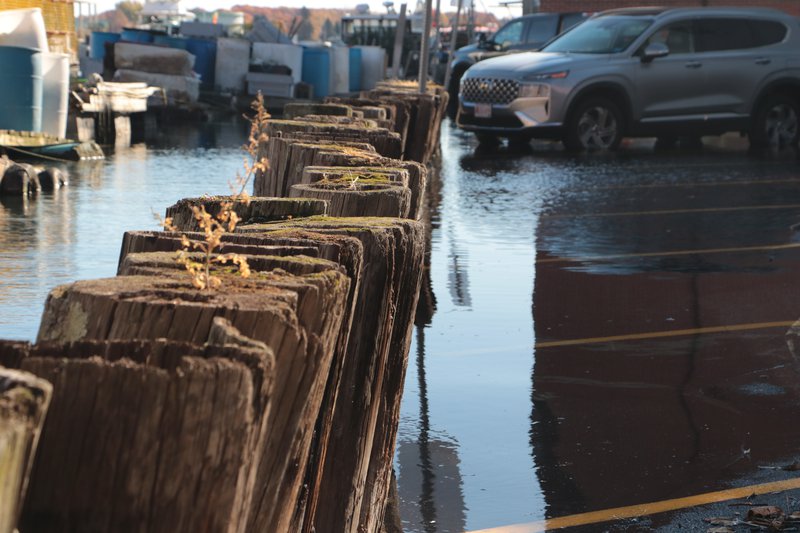

V. Recognition and Awards

Kanae Tokunaga:
New appointments include Lead Author for IPBES Transformative Change Assessment – Ch4. Overcoming the challenges of achieving transformative change toward a sustainable world, a member of the NEFMC’s Ecosystem-based Fisheries Management Plan Development Team, and an editorial board member for ICES Journal of Marine Science.
Kanae was interviewed for the following article in March:
Whittle, Patrick “Seafood industry braces for losses of jobs, fish due to sanctions on Russia” (March 31, 2022)

Kathy Mills:
Kathy Mills has been credited in over 40 online, print, radio, and TV stories appearing in local, national, and international outlets since January 2022. Many of these stories focused on rapid warming, record temperatures, and marine heatwaves in the Gulf of Maine and Northeast region. Several of them extended to the effects of warm ocean temperatures on the ecosystem, including zooplankton, fish and lobsters, and puffins. In addition, several stories focused on how fisheries are being affected by warming and species changes. Highlights included a live segment on the PBS NewsHour addressing warming, species changes, and fisheries adaptation in the Northeast US; a Washington Post story on warming and shifting species; and an in-depth GMRI blog post about the lab's Atlantic salmon research.

Lisa Kerr:
Lisa Kerr has been recognized for her exceptional work in stock assessment and has transitioned to the position of New England Fishery Management Council Science and Statistical Committee Chair where she leads discussions of emergent, high-priority issues in regional fishery management. She also serves as Member/Chair of research track stock assessment working groups. Lisa also was appointed as the lead to the cross-scale interdisciplinary project and team: Northeast Climate Integrated Modeling (NCLIM).



